
Taking a walk before or after eating promotes healthy metabolic activity, but walking before the body has ingested food enacts different chemical reactions than walking after the body has begun digesting the food. No matter whether you decide to walk before or after dinner or another meal, remember that whenever you participate in physical activity appropriate for your age and condition, you're enhancing your overall health.
Walking Before a Meal
Video of the Day
Walking within a half hour or so of eating a meal decreases the amount of sugar and fats that accumulate in the blood after eating, especially when they originate from foods high in protein or carbohydrates. Physical activity also stimulates your metabolism, which burns energy and calories.
Video of the Day
According to a 2006 study published in Applied Physiology, Nutrition, and Metabolism, people who walked prior to putting any food in their stomachs and walked hard enough to perspire burned more fat than those who walked after eating.
A more recent study published in 2015 in the International Journal of General Medicine, reaffirmed that a fast-paced walk in a fasting state helps your body burn more fat.
Decrease in Appetite
When you engage in any moderate to rigorous activity, your appetite tends to immediately diminish due to elevation in body temperature. When the body is warmer than normal, it concentrates on lowering that temperature to maintain homeostasis. Appetite and digestion temporarily are pushed aside until the body is no longer stressed by heat.
However, once you are cooler, your appetite returns. So if you're trying to lose weight, walking before a meal might help reduce your intake of food, especially if your walk produces a significant increase in internal temperature.
Walking After a Meal
Depending on how much food you consume, engaging in light or moderate walking is an excellent way to rev up your metabolism and burn off those calories, as well as contribute to muscle and heart health.
However, brisk walking is not suggested after consuming a heavy meal because the body is trying to digest a large mass of food while vigorously walking at the same time. This causes the blood supply to overextend itself, which forces the heart to perform at twice its rate. Wait about 45 minutes to an hour to walk after big meals.
Help for Insomnia
People who have trouble falling asleep might benefit from taking a walk after the evening meal. This is because the chemicals needed to induce sleep are byproducts of metabolic activity, especially when sugar is burned for energy. So the more sugar utilized in performing physical activity, the more sleep chemicals are produced.
In addition, light activity like walking has also proven to lessen or even eliminate evening food cravings.
Refueling After Your Walk
Whether you're walking before or after you eat, be sure to refuel after you've completed your workout. Most important, drink at least 2 cups of water. If your workout was strenuous and done on an empty stomach, refuel your body with a snack or meal filled with a healthy mix of carbs and protein, such as a glass of chocolate milk, peanut butter and banana, or a turkey sandwich.
- Applied Physiology, Nutrition, and Metabolism: Acute Effects of Exercise Timing and Breakfast Meal Glycemic Index On Exercise-Induced Fat Oxidation
- UC Berkeley: University Health Services: Exercise: Fitting Fitness In
- International Journal of General Medicine: Acute Metabolic Response to Fasted and Postprandial Exercise
- American Council on Exercise: Pre- and Post-Workout Nutrition for Strength Training
- Academy of Nutrition and Dietetics: How to Fuel Your Workout